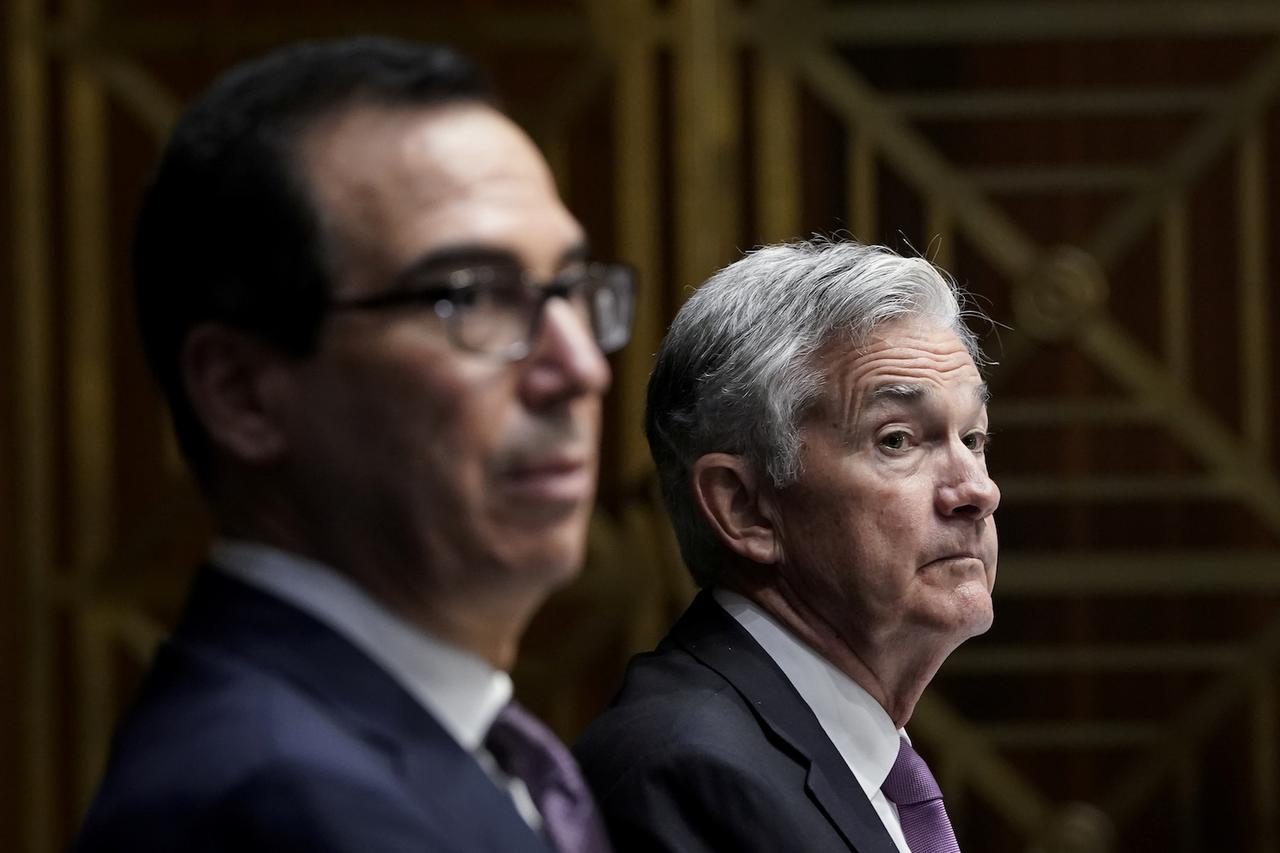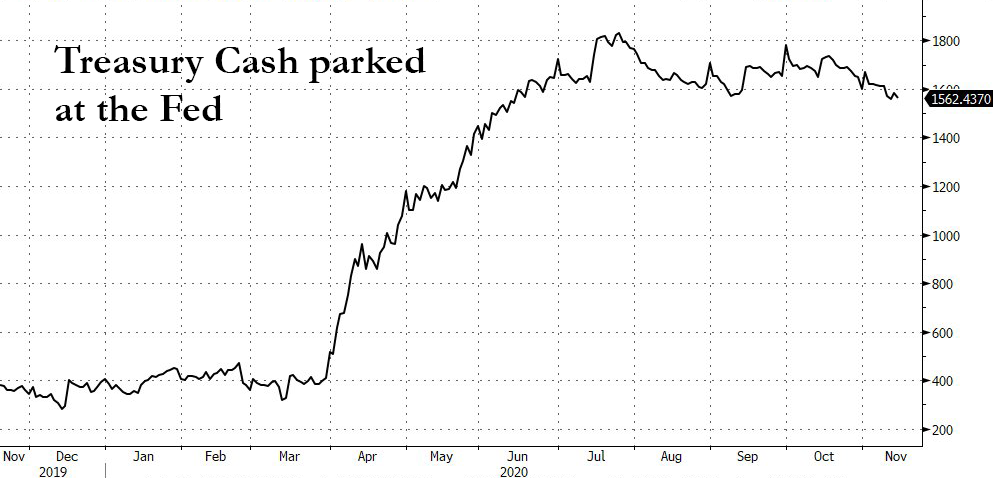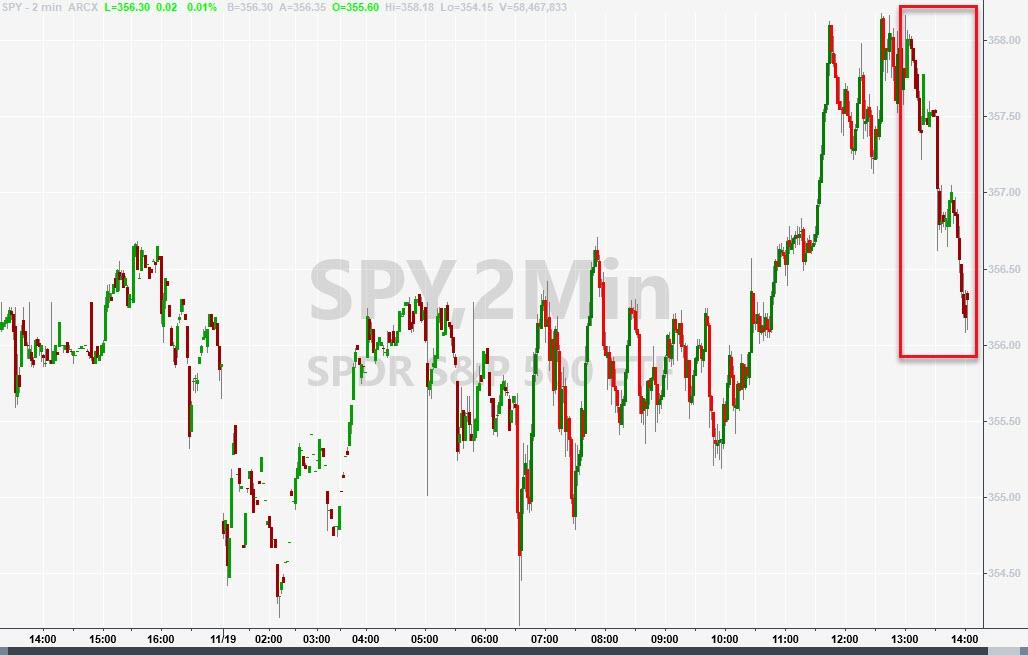Fed Furious After Mnuchin Refuses To Extend Some Bailout Programs
Update (13:55 ET): That didn't take long. The Fed, as we suspected, is furious, issuing a statement:
"The Federal Reserve would prefer that the full suite of emergency facilities established during the coronavirus pandemic continue to serve their important role as a backstop for our still-strained and vulnerable economy."
For the Fed to publicly respond so quickly is quite a change of regime for the typically stoic and 'independent' entity.
The money helicopter just crashed
— zerohedge (@zerohedge) November 19, 2020
***
Despite Fed Chair Powell's desire for them to remain in place, Treasury Secretary Steven Mnuchin has declined to extend several emergency loan programs established jointly with the Fed that are set to expire on Dec. 31.

The Fed's corporate credit, municipal lending, and Main Street Lending Program won't be renewed, Mr. Mnuchin said Thursday.
Powell said earlier in the week that "The Fed will be strongly committed to using all of our tools to support the economy for as long as it takes until the job is well and truly done. When the right time comes, and I don't think that time is yet or very soon, we will put those tools away."
But now, WSJ reports that, in a letter to Mr. Powell on Thursday, Mr. Mnuchin said the facilities, backstopped by the Treasury with funds authorized under March's Cares Act, "have clearly achieved their objective."
Bond issuance volumes, which sank in March, have returned to their pre-Covid-19 levels along with borrowing spreads.
"Banks have the lending capacity to meet the borrowing needs of their corporate, municipal and nonprofit clients," he said.
In fact, bond yields and spreads are at all-time record lows (despite surging debt/leverage).
Mnuchin almost noted that the move would allow Congress to reappropriate approximately USD 455bln remaining from the CARES Act.
(Click on image to enlarge)

This, we are sure, will infuriate The Fed. In recent weeks they have been vocal about the need for these programs to remain in place:
- Federal Reserve Financial Stability Report noted that money markets have stabilized but would be vulnerable in the absence of emergency facilities. (Nov 9th)
- Chair Powell said the time is not right yet to put away the Fed's emergency tools (Nov 17th). Powell also said on the Nov 5th FOMC that if things deteriorate, the emergency facilities can be extended
- Vice-Chair Clarida said 13(3) facilities have been successful and the Fed is just turning to discussion on their expiration; no more guidance to offer on 13-3 extension beyond year-end (Nov 16th)
- Barkin (2021 voter) said the impact of the shelving of the 13(3) Emergency Facilities on financial markets is unclear; if you take them away, it may not have a big impact, but there is an increased risk (Nov 18th)
- Bostic (2021 voter) said emergency programs need to be kept open and available (Nov 17th)
- Daly (2021 voter) said she is confident the Fed and Treasury will keep any or all of the 13-3 facilities that may still be needed (Nov 10th)
- Mester (2020 voter) said she would extend all of the Fed's emergency lending facilities if it were up to her as they are still needed (Nov 9th)
- Bullard (non-voter) said even if Fed emergency programs are shut down at year-end, markets would know they can be reopened (Nov 13th)
Stocks have slipped after hours on the news...
(Click on image to enlarge)

***
Here is the Treasury statement:
Today U.S. Treasury Secretary Steven T. Mnuchin sent a letter to Chairman of the Federal Reserve Board of Governors Jerome Powell requesting a 90-day extension of the Commercial Paper Funding Facility (CPFF), the Primary Dealer Credit Facility (PDCF), the Money Market Liquidity Facility (MMLF) and the Paycheck Protection Program Liquidity Facility (PPPLF).
“With respect to the facilities that used CARES Act funding (PMCCF, SMCCF, MLF, MSLP, and TALF), I was personally involved in drafting the relevant part of the legislation and believe the Congressional intent as outlined in Section 4029 was to have the authority to originate new loans or purchase new assets (either directly or indirectly) expire on December 31, 2020. As such, I am requesting that the Federal Reserve return the unused funds to the Treasury. This will allow Congress to re-appropriate $455 billion, consisting of $429 billion in excess Treasury funds for the Federal Reserve facilities and $26 billion in unused Treasury direct loan funds,” said Secretary Steven T. Mnuchin.
“In the unlikely event that it becomes necessary in the future to reestablish any of these facilities, the Federal Reserve can request approval from the Secretary of the Treasury and, upon approval, the facilities can be funded with Core ESF funds, to the extent permitted by law, or additional funds appropriated by Congress. I am deeply honored to have worked on executing these programs and hope that because of our collective actions, Congress will show similar trust in Federal Reserve Chairs and Treasury Secretaries in the future.”
Read the full letter to The Fed here...
***
On a side note, some have suggested that the last sentence sound a lot like a concession:
I am deeply honored to have worked on executing these programs and hope that because of our collective actions, Congress will show similar trust in Federal Reserve Chairs and Treasury Secretaries in the future.
Disclosure: Copyright ©2009-2020 ZeroHedge.com/ABC Media, LTD; All Rights Reserved. Zero Hedge is intended for Mature Audiences. Familiarize yourself with our legal and use policies ...
more



"Congress trusting the Federal Reserve Chairs"?? Yes, it appears that congress has trusted the Fed, probably for far too long. Why else would we be in a situation where savings pay no interest? Where cheap credit can bid up prices and push towards inflation, which benefits the stock traders but erodes the value of the savings of the normal folks. Does anybody else see a flaw in this set of priorities?
This nation, and the rest of the world as well, is suffering from a plague spread around by a lack of competence of those able to have an affect. Now is the struggle to survive a disease that kills about 2% of those infected. Closing everything is unfortunately a temporary measure to slow, but not stop, the rapid spread. Those unintended secondary effects of damaging the welfare of most and the economy of nearly all are very real.
The only obvious fix is an effective vaccine, applied to all. Unfortunately the reality is that such can not happen fast enough, even if every part of the process functions perfectly. Given the demonstrated abilities of most governments that seems rather unlikely.